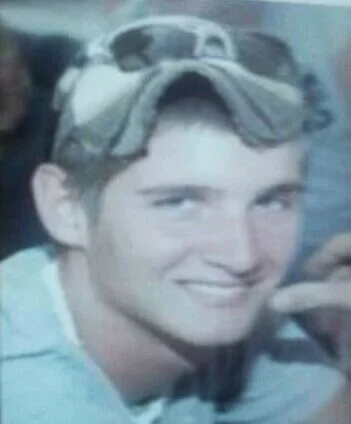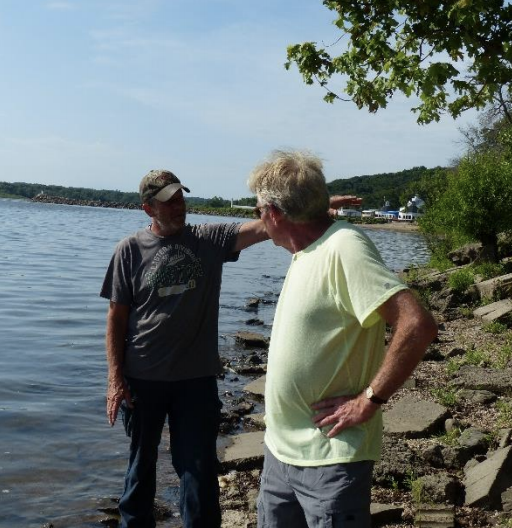by Mike Bailey
Dallas Atherton
Every year on October 5, Patty Atherton sits down to write a letter to her son, Dallas.
“If you knew how much I loved you,” she begins, “would you have said goodbye?”
“I’ve never told anyone this…I don’t think he knew how much people loved him. That’s what makes me sad, that there are plenty of people in the world who don’t think they’re loved.”
Dallas Atherton was 19 when he took his own life on October 5, 2007.
The ensuing 13 years have made it easier for his parents, Dwayne and Patty Atherton, to cope, though the sense of loss has never ebbed. A day doesn’t go by without reflecting on his memory, but their grief has been nudged aside by a resolve to do something meaningful to preserve Dallas’ legacy and to spare other families what they experienced, tragically, with a struggling child.
To that end, they are teaming up with entrepreneur and philanthropist Kim Blickenstaff and Carl Cannon, founder of the Peoria-based organization ELITE Youth Outreach, a program dedicated to throwing a life preserver to young people at risk of ending up on a destructive path.
Camp Dallas will open in Summer 2021 on the Sankoty Lakes Resort and Retreat property, a joint development between Blickenstaff and Atherton, in Spring Bay. “From the time that we were able to start recovering – I’m not sure that’s the word I want to use but that’s the one I have – we knew we had to make a difference,” said Patty. “We knew there were other people out there who felt the way Dallas did.
“It’s so important to us to get to at least one kid. The fact that Dallas was sad and we didn’t know it is the worst feeling. If we can ease that for someone else …
“All children deserve to be loved and to feel loved.”
Carl Cannon
‘I say game, you say changer!’
Carl Cannon is in his element at the Trewyn Park Pavilion deep on Peoria’s South Side, and he’s working up a head of steam with 15 of his most challenging kids, “the worst of the worst,” the ones in his red zone, living in the “most toxic environments,” in danger of succumbing to all the negative pressures in their life.
They call him “C.O.,” which stands for “correctional officer,” which is what he used to be at the federal prison in Pekin. “Now it’s used as a term of endearment,” Cannon says. “I am the hard guy, I guess, the one who’s trying to save lives.”
Cannon opened ELITE 20 years ago to try to keep those kids out of his former workplace and others like it by trying to intervene before they could choose lives of crime. He’s achieved success with hundreds who have graduated from the program to become productive adults. Others – growing up in households of poverty, abuse, neglect, drug addiction, joblessness, fatherlessness, hopelessness, etc. – have had to learn the lessons he teaches the hard way.
They’re his focus now.
“I say game, you say changer!” he exhorts the room, in reference to the latest evolution of ELITE, Game Changers, a program which puts the most imperiled young people in ELITE’s charge in contact with those “who’ve been there, done that,” who have managed to turn their lives around and don’t want these young people to make the same mistakes they did. In effect, they become surrogate parents, in partnership with the kids’ own parents.
“You have to decide that what’s in your mirror is right. God did it right,” Cannon tells them. “If I could give you anything, I’d give you my eyes so you could see what I see right now.
“It’s your turn, but you have to step up. We can’t help you unless you’re willing to help yourself.”
They hear the message almost daily.
“We’ve been doing this for so long, we do believe we have the formula. If given the right tools, we can make a difference,” said Cannon. “I’ve never been as driven as I am now.”
In part, that’s because Blickenstaff and the Athertons have just contributed in no small way to ELITE’s tool box. Cannon was working with an architect at Farnsworth Group on plans for an ELITE community center when the latter said, “I know Kim (Blickenstaff). Would you like to meet him? He’d like to meet you.”
“He shared his vision, and we’ve been married ever since,” Cannon said. “When we got a chance to go out to Sankoty, to Camp Dallas, oh my gosh, that’s game changing.
“A lot of our kids never get out of the neighborhood … At Sankoty, they can go to sleep in a place without gunfire.
“This is the great escape. It is a chance to let yesterday go, to have this day, and to dream about tomorrow.”
“The kids just light up when they’re out here,” said Dwayne Atherton. “To see them catch a fish and squeal and have a ball …Literally, it took only 10 minutes to get to these kids and get them participating.
“What I’m most passionate about is making them feel good about themselves.”
‘I realized helping other people would help me’
For a couple of years after Dallas’ death, Dwayne didn’t want to go on living much himself. They had been father and son but also the best of friends.
“I put my family through another kind of hell,” he said. “But then I figured out my wife and daughter also had lost a son and a brother. We had grandkids and I realized I wanted to live. That’s what saved my life.”
And one other thing.
“I realized helping other people would help me. And my wife did the same.”
In fact, the Athertons were involved with the Big Brothers program when Dallas was still alive, starting with a young man and his younger twin brothers – McKale, Malik and Milan -- whom they took fishing. By the time word got out in the boys’ Bigelow neighborhood in Peoria, they had other kids chasing their vehicle down the street asking, “Will you be my big brother?”
The Athertons have been married for 34 years, and in that time, Dwayne figures there were children besides their own staying for stretches for all but six months. They’ve mentored more than 20 children and keep contact with them still.
“To this day, all of them have stayed out of trouble,” he said. “They’re assets to the community.”
That desire to help stems from his own childhood.
“My dad died when I was 12. I’d hang out with his buddies,” who took him duck hunting and taught him how to weld and to work on engines. “I picked out the mentors I needed. Spring Bay was an awesome place to grow up. The whole town pitched in to help me.
“All of that stuff stuck. What I do for people is because of what they did for me.” He passed that trait on to Dallas.
“Dallas’ favorite things in the world were Christmas and the 4th of July and mentoring those kids,” said his father.
When Blickenstaff approached Atherton about Sankoty, the latter shared “my dreams of having a camp and helping kids realize life in the great outdoors. I want to give them an alternative path before they get into trouble … It’s a way my wife and I can keep Dallas’ memory alive.
“Basically, Kim comes along and all the dreams I had of helping people … it can actually happen.”
‘I want other kids to enjoy what my son got to enjoy’
Who was Dallas?
He ran and ruled the property that would become Sankoty, his little slice of heaven. He hunted and fished it, rode his 4-wheeler, shot his BB gun, swam and kayaked its lakes. He skate-boarded on a self-made ramp and played paintball.
He adored his animals.
He wrestled in high school, loved his big black truck, and sported a tattoo of a cross that is now in the Camp Dallas logo. He worked in the family construction business and knew how to operate a dump truck by the time he was a fourth grader.
“He played hard. He worked hard. He had amazing friends. He had girlfriends,” said his mother. “He was so sweet and so ornery.”
In retrospect, there were signs of depression, which the Athertons attributed at the time to just being a teenager. “He was sleeping a lot, but teenagers do that,” said Patty. “We just didn’t think it was something he was thinking about.”
Ultimately, he made a decision, in the moment, that couldn’t be reversed. “In the short time he was here, he made a big difference,” said his mom. Other kids were attracted to him. “He would have been the funnest uncle, that’s for sure.”
“He was a good boy,” said Dwayne. “He lived life. He had fun while he was here. “I feel him all the time here, you bet. He had this place every day of his life. I want other kids to enjoy what my son got to enjoy.”
‘I have a gratitude list…This place is at the top of it’
Cannon and the Athertons envision a Camp Dallas where children from all over Central Illinois – those struggling with all types of hardship, from their life situations to illness – can escape from their problems to enjoy the outdoors and all the lessons it holds. Some will have the opportunity to learn life and job skills.
Some may find employment at Sankoty.
They envision a whole bank of bunkhouses, converted from former shipping containers, that will hold up to 30 kids at any given time. The kids will be in on the ground floor of helping to design and construct them.
Mostly, it’s a place where they’ll be able to have fun, to truly be kids, to learn that others care for them and that they can do the same in return.
“You can’t help but be touched by their story,” Blickenstaff said of the Athertons.
“What they’re doing – trying to take a deeply personal tragedy and turn it into a way to help others – I just find truly admirable. They are a special family. If I can help them touch as many lives as possible in a positive way, I’m honored to do so.
“I also believe we have found an excellent partner in Carl Cannon and his ELITE group.
Our missions complement one another.
I’m excited about what we can accomplish together to help make life better – and by extension our collective future – for these kids.”
“Every day before my feet hit the floor, I have a gratitude list,” said Dwayne Atherton. “And this place is at the top of it because it’s going to help so many people.”















